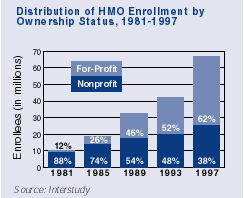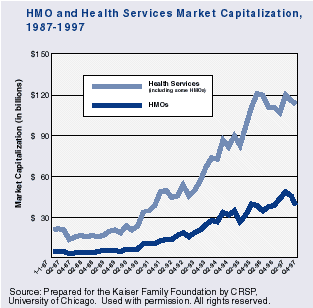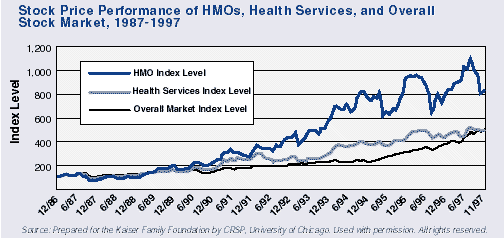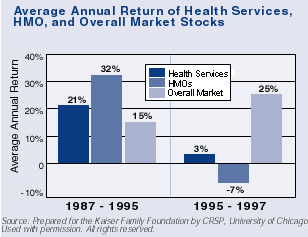For-Profit Health Care Companies: Trends and Issues - Fact Sheet
The rapid growth of managed care has brought with it a growing connection between the stock market and health care organizations. Health care services have evolved from being delivered by physicians and tax exempt institutions to a market-driven industry attracting investment capital from numerous sources. The market capitalization, or total stock value, of the relatively young HMO industry grew from a little over $3 billion in 1987 to almost $39 billion in 1997 – an almost twelve-fold increase – while the stock market as a whole grew about four-fold to a total of $10.5 trillion. However, recent health plan earnings announcements indicating companies’ difficulties in managing medical costs have led some equity analysts and investors to question whether these health sector stocks will offer growth potential in the future.
Some health care providers, policy-makers, and consumer advocates question whether it is appropriate that profit motives and goals to maximize stock values drive changes in the health care system. They argue that the types of decisions that ensure shareholder value are not necessarily the same as those that would guarantee quality health care. On the other hand, many industry representatives and investors credit market incentives and for-profit companies with fundamentally restructuring health services in a manner that has promoted efficiency and entrepreneurship in an industry in need of change.
The Growing Influence of For-Profit Organizations
 The increased corporate influence in health care is especially evident in the growing prevalence of for-profit companies within the HMO sector. Between 1981 and 1997, for-profit HMOs grew from representing 12% to 62% of total HMO enrollees, and from 18% to 75% of plans (Interstudy). Among hospitals, on the other hand, for-profit companies have increased their role, but nonprofit organizations continue to dominate the industry. Between 1981 and 1995, for-profit companies grew from representing 9% to 12% of community hospital beds, and from 13% to 14% of community hospitals (American Hospital Association data).
The increased corporate influence in health care is especially evident in the growing prevalence of for-profit companies within the HMO sector. Between 1981 and 1997, for-profit HMOs grew from representing 12% to 62% of total HMO enrollees, and from 18% to 75% of plans (Interstudy). Among hospitals, on the other hand, for-profit companies have increased their role, but nonprofit organizations continue to dominate the industry. Between 1981 and 1995, for-profit companies grew from representing 9% to 12% of community hospital beds, and from 13% to 14% of community hospitals (American Hospital Association data).
Total market capitalization of HMOs grew from $3.3 billion in January 1987 to $38.9 billion as of the end of November 1997, an almost twelve-fold increase.
The growing role of for-profit companies in the HMO and hospital sectors has resulted from a combination of the emergence and growth of for-profit companies, as well as conversion of not-for-profit companies to for-profit status. One implication of these conversions is the establishment of charitable foundations designed to preserve the charitable missions and assets of the formerly not-for-profit organizations. As of September 1, 1997, there were 81 conversion foundations in the U.S., with assets totaling $9.3 billion. Health plan conversions represented the source of only 12 of the foundations, but these foundations hold almost half of the total assets (Grantmakers in Health).
Stock Trends
Many for-profit health services and HMO companies have tapped the stock market for financing. According to an analysis prepared for the Kaiser Family Foundation by Securities Data Company, there were 233 initial public offerings (IPOs) of stock of health services and HMO companies between 1987 and 1997.
The total stock value (or market capitalization) of publicly traded health services and HMO companies has increased dramatically over the past decade. Total market capitalization of HMOs grew from $3.3 billion in January 1987 to $38.9 billion as of the end of November 1997, an almost twelve-fold increase. For companies classifying themselves as health services, capitalization grew from $16.3 billion to $112.7 billion over the same time frame. In comparison, the overall stock market grew a little over four-fold during this time period. Wall Street’s growing interest and role in health care companies is also evidenced by the increased number of investment analysts following health care stocks – from 152 in 1987 to 559 in 1997, according to Nelson’s Directory of Investment Research.
 Over the last decade, HMO stocks have generally out-performed the market as a whole, although these companies experienced significant price declines between March and August 1995, between April and July 1996, and between July and November 1997. Health services companies have tracked somewhat above the market through much of the decade, but the ten-year return for the overall market and health services companies is equal. Using a University of Chicago index that measures the market-weighted return of stocks, a 1987 investment of $100 in the market as a whole or in health services companies would have grown to $492 by the end of November 1997. In comparison, an investment of $100 in HMOs would have grown to $821.
Over the last decade, HMO stocks have generally out-performed the market as a whole, although these companies experienced significant price declines between March and August 1995, between April and July 1996, and between July and November 1997. Health services companies have tracked somewhat above the market through much of the decade, but the ten-year return for the overall market and health services companies is equal. Using a University of Chicago index that measures the market-weighted return of stocks, a 1987 investment of $100 in the market as a whole or in health services companies would have grown to $492 by the end of November 1997. In comparison, an investment of $100 in HMOs would have grown to $821.
Recently, average annual returns for health services and HMO companies have suffered relative to the overall market. While the market has achieved record levels, these health companies have experienced some notable difficulties.

Recent Events
Recent public announcements highlight anxiety among those on all sides of the question about the appropriate role for the stock market within the health services industry. Investors who were bullish on health care stocks in the past voted with their portfolios after being surprised by recent bad news from some of the largest and best-performing publicly traded health care companies. The largest publicly traded HMO, Aetna/U.S. Healthcare, suffered a greater than 10% decline in its stock price in December 1997 over the two days following an announcement that its chief financial officer would be stepping down amid rumored problems in managing the post-merger operations of U.S. Healthcare. Oxford Health Plan lost 75% of its stock market value between late October 1997 and the end of the year, when the company disclosed a charge to earnings stemming from accounting and computer problems affecting estimates of medical care costs and payments due to providers. Some also point to Oxford
Oxford Health Plan lost 75% of its stock market value between late October 1997 and the end of the year, when the company disclosed a charge to earnings stemming from accounting and computer problems affecting estimates of medical care costs and payments due to providers. Some also point to Oxford
